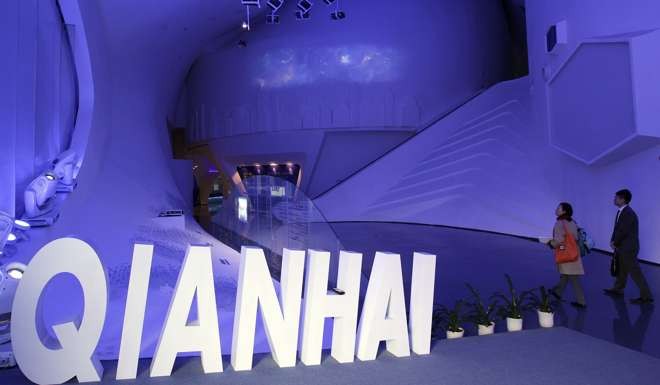
‘Small fund town’ planned to open in Qianhai by October next year
Site to contain 29 buildings, capable of housing around large 100 fund operations, as special economic zone bids to lure asset management firms

Officials in Qianhai, China’s special economic zone next to Shenzhen, are planning to build a new 150,000 square metre “small fund town” in a bid to attract more asset management firms, the latest effort by Beijing to promote the site as a financial services hub.
Qianhai Financial Holdings, the Qianhai Authority’s investment arm, is teaming up with Shenzhen Metro to build 29 major buildings capable of housing around large 100 fund operations. Construction on the complex is expected to be complete by October next year.
Shenzhen Metro owns the land and is the main developer, while Qianhai Financial Holdings will handle the management, rent collection and other services.
The details were revealed in Hong Kong on Tuesday by officials including Witman Hung, principal liaison officer for Hong Kong office of the Quanhai Authority, at a forum attended by around 200 government officials and fund company representatives.
Hung told South China Morning Post the idea follows a similar concept launched in the US.
“Greenwich in the US has a fund town area where all types of firms get together to have their offices next to each other. There are coffee shops, restaurants and other supporting facilities,” Hung said.
“Qianhai’s fund town will be developed along similar lines, so fund companies can have a comfortable and relaxing environment in which to do business,” he said.

“We aim to target both international fund houses investing in the mainland, and mainland fund houses wanting to invest overseas,” Hung said.
“Qianhai is in an ideal location for both mutual funds and hedge funds to develop, as we are just an hour by car from Hong Kong and offer special policies to encourage financial firms.”
Qianhai already has nearly 5,000 fund companies registered in the city.
Qianhai Financial chairman Li Qiang told the event that the small fund town project was not for profit.
“We will offer rental levels lower than the market rate for large fund houses to base themselves in Qianhai. It is our government policy to ensure Qianhai becomes a financial services centre.
“Fund management is an important element of our policy,” Li said.
Hang Seng Bank, which is owned by HSBC, last month opened a mutual fund company in Qianhai’s existing financial district, becoming the first foreign company to own a majority stake in a fund joint venture in China.
We aim to target both international fund houses investing in the mainland, and mainland fund houses wanting to invest overseas
Hang Seng Bank executive director Andrew Fung said on Tuesday his new fund house would review if it might move into the fund town, when the current Qianhai office lease expires in November next year.
“We would need to consider a number of factors, but overall I think it is a good idea for fund houses to be located in the same area to allow fund mangers to exchange ideas,” he told the Post.
Under that licence requirement, the venture can market approved products across China from its base in the economic zone.
Hang Seng owns 70 per cent of Hang Seng Qianhai Fund Management, which has a registered capital of 200 million yuan, with Qianhai Financial Holdings owning the remaining 30 per cent.
The Bank of East Asia has also been approved to set up a joint venture securities firm in the zone in which it owns a minority stake.
Companies registered in the zone that meet certain criteria pay a 15 per cent corporate tax rate, compared with the normal 25 per cent, while qualifying individuals are assessed at 15 per cent, against the standard 40 per cent.
The appealing rates have already attracted many Hong Kong, mainland and multinational firms to set up in Qianhai.
By June 15, 100,000 companies with around 4.97 trillion yuan worth of registered capital had created operations within the site, 10 times more than in 2014.